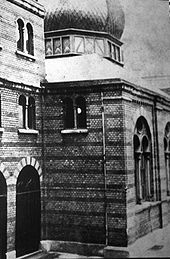Emanuel Carlebach
Emanuel Shalom Menachem Carlebach (born January 18, 1874 in Lübeck ; died December 3, 1927 in Cologne ) was a German rabbi and educator .
Life
Emanuel Carlebach was the second of twelve children of the Lübeck rabbi Salomon Carlebach (1845-1919) and his wife Esther Carlebach , née Adler (1853-1920). The family produced several eminent rabbis. Emanuel Carlebach attended the Katharineum in Lübeck until graduation in 1893 and then studied philosophy at the universities of Berlin and Würzburg. He attended at the same time the rabbinical seminary in Berlin from Hirsch Hildesheimer . In Würzburg, he was in 1896 with a dissertation on Guyau Dr. phil. PhD. He then attended the orthodox rabbi seminar in Frankfurt am Main until 1898, where he was ordained a rabbi by Salomon Breuer .
In 1898 the Jewish community of Memel elected him their district rabbi. Carlebach thus gained his first contact with Judaism in Eastern Europe and founded the first religious school, which he directed himself. In the summer of 1904 he was appointed to Cologne. Emanuel Carlebach became rabbi of the Adass-Jeschurun synagogue and director of the Jewish teachers' college in Cologne. An organ conflict in Cologne in 1906 led to the separation of part of the Orthodox Jewish community under Carlebach's leadership from the large Jewish community of Cologne.
During the First World War , Carlebach, together with Pinchas Kohn , worked as an advisor to the German military administration in Warsaw on matters relating to the administration of Jewish schools from 1916 , most recently in 1918 in the uniform of a field rabbi of the German army. One of his tasks was to convince Jewish community leaders that the enormous risk of spotted fever of the First World War required different hygiene measures than was usual up to that point in time. This is not an attack on the inner spirituality of Judaism. In Poland, Carlebach was one of the founders of the Orthodox Agudath Israel movement in 1916 .
After the war, he resumed service in the community and in the Jewish school system in Cologne. In 1919 he initiated the founding of a private Jewish secondary school in Cologne. The Jawne Jewish high school emerged from this in 1921 , and after the death of the first director he also took over the management of the school in addition to his two other functions. In 1924 he fell seriously ill and died of a heart attack in 1927 .
Fonts
- Guyau's metaphysical beliefs , 1896 (dissertation)
family
Emanuel Carlebach was married to Minna Joel (1873–1948) since 1898. The two had four sons. The eldest son David Carlebach (1899–1952) was also a rabbi in Cologne and successor in his father's community from 1929 until he emigrated in 1937. Emanuel Carlebach was first buried in the Jewish cemetery in Cologne-Deckstein and reburied in 1948 in Palestine .
literature
- Hans Hengsbach: Emanuel Carlebach. In: Biographical Lexicon for Schleswig-Holstein and Lübeck Volume 12, Neumünster 2006, pp. 62–65
- Michael Brocke , Julius Carlebach : The Rabbis in the German Empire 1871-1945 , Walter de Gruyter, 2009, pp. 112–113 No. 2067
- Esriel Hildesheimer, Mordechai Eliav: Das Berliner Rabbinerseminar 1873-1938 , Berlin 2008, ISBN 9783938485460 , p. 88
- Carlebach, Emanuel. In: Lexicon of German-Jewish Authors . Volume 4: Brech-Carle. Edited by the Bibliographia Judaica archive. Saur, Munich 1996, ISBN 3-598-22684-5 , pp. 430-431.
- Horst Matzerath , Elfi Pracht , Barbara Becker-Jákli (eds.): Jüdisches Schicksal in Köln 1918-1945 - Catalog for the exhibition of the Historical Archive of the City of Kön / NS Documentation Center (November 8, 1988 to January 22, 1989, in the Cologne City Museum / Alte Wache), City of Cologne 1988, page 31
Individual evidence
- ^ Hermann Genzken: The Abitur graduates of the Katharineum zu Lübeck (grammar school and secondary school) from Easter 1807 to 1907. Borchers, Lübeck 1907. (Supplement to the school program 1907) Digitized version no. 988
- ↑ Joseph Walk (ed.): Short biographies on the history of the Jews 1918–1945 . Saur, Munich 1988, ISBN 3-598-10477-4 , p. 53.
- ^ Wolfgang U. Eckart : Medicine and War. Germany 1914-1924 , Ferdinand Schöningh Verlag Paderborn 2014, p. 185, ISBN 978-3-506-75677-0 . Here also comments on the anti-Semitic character of this forced sanitation in the winter of 1917/1918.
| personal data | |
|---|---|
| SURNAME | Carlebach, Emanuel |
| ALTERNATIVE NAMES | Carlebach, Emanuel Shalom Menachem (full name) |
| BRIEF DESCRIPTION | German rabbi and educator |
| DATE OF BIRTH | January 18, 1874 |
| PLACE OF BIRTH | Lübeck |
| DATE OF DEATH | December 3, 1927 |
| Place of death | Cologne |

